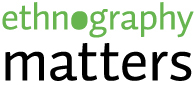Studying Up: The Ethnography of Technologists
Editor’s Note: Nick Seaver (@npseaver) kicks off the March-April special edition of Ethnography Matters, which will feature a number of researchers at the Intel Science and Technology Center for Social Computing on the forefront of exploring the cultures of hackers, makers, and engineers.
Nick’s post makes the case for the importance of “studying up“: doing ethnographies not only of disempowered groups, but of groups who wield power in society, perhaps even more than the ethnographers themselves.
Nick’s own research explores how people imagine and negotiate the relationship between cultural and technical domains, particularly in the organization, reproduction, and dissemination of sonic materials. His current project focuses on the development of algorithmic music recommendation systems. Nick is a PhD candidate in sociocultural anthropology at UC Irvine. Before coming to UCI, Nick researched the history of the player piano at MIT.
When people in the tech industry hear “ethnography,” they tend to think “user research.” Whether we’re talking about broad, multinational explorations or narrowly targeted interviews, ethnography has proven to be a fantastic way to bring outside voices in to the making of technology. As a growing collection of writing on Ethnography Matters attests, ethnography can help us better understand how technology fits into people’s everyday lives, how “users” turn technologies to unexpected ends, and how across the world, technologies get taken up or rejected in a diverse range of cultural contexts. Ethnography takes “users” and shows how they are people — creative, cultural, and contextual, rarely fitting into the small boxes that the term “user” provides for them.
But ethnography doesn’t have to be limited to “users.”

Engineers in context. cc by-nc-nd 2.0 | http://www.flickr.com/somewhatfrank
My ethnographic research is focused on the developers of technologies — specifically, people who design and build systems for music recommendation. These systems, like Pandora, Spotify, Songza, or Beats Music, suggest listening material to users, drawing on a mix of data sources, algorithms, and human curation. The people who build them are the typical audience for ethnographic user studies: they’re producing technology that works in an explicitly cultural domain, trying to model and profile a diverse range of users. But for the engineers, product managers, and researchers I work with, ethnography takes a backseat to other ways of knowing people: data mining, machine learning, and personal experience as a music listener are far more common sources of information.
Ethnographers with an interest in big data have worked hard to define what they do in relation to these other methods. Ethnography, they argue, provides thick, specific, contextualized understanding, which can complement and sometimes correct the findings of the more quantitative, formalized methods that dominate in tech companies. However, our understandings of what big data researchers actually do tend to lack the specificity and thickness we bring to our descriptions of users.
Just as ethnography is an excellent tool for showing how “users” are more complicated than one might have thought, it is also useful for understanding the processes through which technologies get built. By turning an ethnographic eye to the designers of technology — to their social and cultural lives, and even to their understandings of users — we can get a more nuanced picture of what goes on under the labels “big data” or “algorithms.” For outsiders interested in the cultural ramifications of technologies like recommender systems, this perspective is crucial for making informed critiques. For developers themselves, being the subject of ethnographic research provides a unique opportunity for reflection and self-evaluation.
Starbucks Listeners and Savants
Among music tech companies, it is very common to think about users in terms of how avidly they consume music. Here is one popular typology, as printed in David Jennings’ book Net, Blogs, and Rock ‘n’ Roll:










Recent Comments